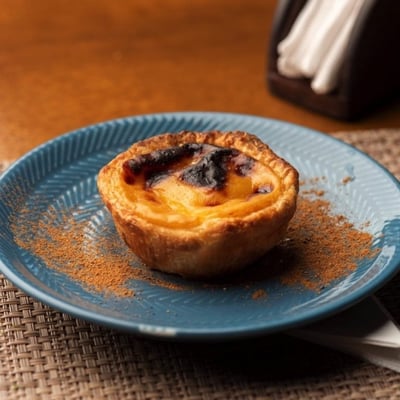1
00:00:01,805 –> 00:00:03,065
Patrícia: Bom apetite!
{{Patricia: Enjoy your meal (Bon appétit)!}}
2
00:00:03,075 –> 00:00:05,905
Hugo: Mas eu não tenho todos os talheres!
{{Hugo: But I do not have all the cutlery!}}
3
00:00:06,085 –> 00:00:07,365
Patrícia: Tens sim.
{{Patricia: Yes you do.}}
4
00:00:07,365 –> 00:00:08,205
Hugo: Não.
{{Hugo: No.}}
5
00:00:08,205 –> 00:00:13,345
Eu tenho uma colher, mas não tenho um garfo nem uma faca.
{{I have a spoon, but I do not have a fork or a knife.}}
6
00:00:13,485 –> 00:00:19,545
Patrícia: Mas tu comes sopa com uma colher, não com garfo e faca.
{{Patricia: But you eat soup with a spoon, not with fork and knife.}}
7
00:00:19,545 –> 00:00:23,805
Hugo: Eu gosto de comer tudo com garfo e faca.
{{Hugo: I like to eat everything with fork and knife.}}
8
00:00:23,805 –> 00:00:27,925
Patrícia: Bem, eu prefiro comer sopa com colher.
{{Patricia: Well, I would rather eat soup with a spoon.}}
9
00:00:27,925 –> 00:00:31,005
Tu comes com garfo e faca?
{{You eat [the soup] with a fork and knife?}}
10
00:00:31,005 –> 00:00:32,445
Boa sorte.
{{Good luck.}}
11
00:00:32,725 –> 00:00:36,525
Hugo: Blech, a sopa está azeda!
{{Hugo: Blech, the soup is sour!}}
12
00:00:36,525 –> 00:00:38,865
Não comemos sopa hoje.
{{We will not eat soup today.}}
13
00:00:38,865 –> 00:00:41,705
Eu cozinho peixe e batatas.
{{I’ll cook fish and potatoes.}}
14
00:00:41,705 –> 00:00:43,165
Patrícia: E bebemos sumo.
{{Patricia: And we’ll drink juice.}}
15
00:00:43,165 –> 00:00:45,345
Hugo: Sim, um sumo doce.
{{Hugo: Yes, a sweet juice.}}
16
00:00:45,345 –> 00:00:51,965
Sumo de morango, sumo de laranja… Mas não temos copos para beber.
{{Strawberry juice, orange juice… But we do not have glasses to drink [with].}}
17
00:00:51,965 –> 00:00:53,505
Patrícia: Estão aqui.
{{Patricia: Here they are.}}
18
00:00:53,505 –> 00:00:54,685
Podemos beber.
{{We can drink.}}
19
00:00:54,685 –> 00:00:55,685
Hugo: Boa.
{{Good.}}
20
00:00:57,925 –> 00:01:00,625
Patrícia: O peixe está bom.
{{Patricia: The fish is good.}}
21
00:01:00,625 –> 00:01:02,825
Tu cozinhas muito bem, querido.
{{You cook very well, dear.}}
22
00:01:02,825 –> 00:01:05,585
Hugo: Sim, eu gosto de cozinhar.
{{Hugo: Yes, I like to cook.}}
23
00:01:05,585 –> 00:01:07,425
Tu não gostas?
{{You do not like [to cook]?}}
24
00:01:07,505 –> 00:01:11,345
Patrícia: Eu gosto, mas eu cozinho muito mal.
{{Patricia: I like to, but I cook very badly.}}
25
00:01:11,425 –> 00:01:14,165
Mas como muito bem…
{{But I eat very well…}}
26
00:01:14,165 –> 00:01:15,505
Hugo: Pois.
{{Hugo: Yeah.}}
27
00:01:15,525 –> 00:01:18,345
Eu cozinho e tu comes tudo!
{{I cook and you eat everything!}}
28
00:01:18,345 –> 00:01:24,065
Patrícia: Sim como tudo à mesa, nos pratos, com os talheres…
{{Patricia: Yes, I eat everything at the table, on the plates, with the cutlery…}}
29
00:01:24,085 –> 00:01:25,985
Hugo: Queres beber café?
{{Hugo: Do you want to drink coffee?}}
30
00:01:25,985 –> 00:01:27,095
Patrícia: Sim.
{{Yes.}}
31
00:01:27,095 –> 00:01:28,465
Hugo: Está aqui.
{{Hugo: Here it is.}}
32
00:01:28,465 –> 00:01:30,465
O café está amargo?
{{Is the coffee bitter?}}
33
00:01:30,465 –> 00:01:31,985
Patrícia: Não.
{{No.}}
34
00:01:31,985 –> 00:01:33,865
O café está doce.
{{The coffee is sweet.}}
35
00:01:33,865 –> 00:01:39,285
Hugo: Pois, é café com açúcar, e o açúcar é doce.
{{Hugo: Yeah, it is coffee with sugar, and the sugar is sweet.}}
36
00:01:39,285 –> 00:01:41,085
Patrícia: Ah, está bem.
{{Patricia: Oh, all right.}}
 We respect your privacy and have a ZERO TOLERANCE for spam.
We respect your privacy and have a ZERO TOLERANCE for spam.
















I love how these convos are getting longer and more lively, introducing life-like words (pois). No sign of the usual textbook dullness! Thanks guys 🙂
very very good
Loved it, I was able to follow it without the script.
The transcript and quiz don’t seem to work for me. But I would like to say how pleased I am with your Portuguese course, it is excellent. Well done!
Com garfo e faca – with fork and knife.
In the UK, if we refer to the above we always say ‘knife and fork’.
Pequenas diferenças:).
Patrick
O Joel e de Canada e sou de EU! Somos irmaos de America do Norte!!! E sempre dizemos “garfo” primeiro!!! 😉
Olá, eu tenho uma pergunta. Por que escrevem “chantili” dessa maneira? Em dois dicionários, encontro “chantilly” escrito desta maneira.
Cumprimentos
Olá, Manfred. “Chantili” é uma simples adaptação portuguesa de “chantilly”. As duas formas são aceites em Portugal. Pessoalmente, eu prefiro “chantilly”.
I like how the quiz introduces new words and the question sentence format. It would be great to be able to hear the questions since we don’t know how to say the new word. Audio for the answer is not necessary.
Oh wow, I was just going to write exactamente what she said above! That it is so giro how the quizzes bring in new phrases and really make your brain work for the answer to wrap up the unit, and that audio for the Qs would be somewhere on the wishlist, though not the highest priority.
Also I wanted to add that the picture quizzes are super helpful, as I was already trying to put an image in my head every time I learn or review a new word. I learned Spanish years ago in school, and we were taught word to word translation – I always struggled to get past translating in my head rather than thinking in the language, and the pictures really help me with that. And the quality of the photos is Just fabulous, as with everything here on PP – quite aesthetically pleasing – y’all have such flair!
And the monkeys on the unit descriptions are sooooooo adrable – are those Wayne creations, too?
Thanks for the kind words, Kelly and glad you like the design! We do put a lot of effort into selecting the right images that are memorable (and with as much diversity as we can find, which is still quite a challenge with stock photography). We all learn differently, so we do our best to appeal to different learning styles… you sound like you’re more of a visual learner!
The original monkey character and the earlier Unit monkey designs were designed by a very talented and hard working artist we connected with years ago, named Kshiraj (https://www.instagram.com/kshiraj/). He soon outgrew us, as he went on to work for Rovio (maker of Angry Birds)! Since then, we’ve worked with a few different artists who have been able to pick up from where he left off by creating additional poses, but it was Kshiraj that originally came up with that character.
Hi, Practiceportuguese Dream Team: great job!
A question: is there a specific difference of use between “ácido” and “azedo”?
Thanks!
Olá, Michele! Thank you for your comment.
‘Ácido’ is the regular term to describe the naturally sour taste of foods such as citrus fruits (e.g. lemons). Many people use ‘azedo’ as a synonym of ‘ácido’, but it often has a negative connotation, suggesting that the food went bad. For example, when we say that a bowl of soup or a glass of milk taste ‘azedo’/’azeda’, we probably mean that they have a sour taste that they shouldn’t have, so they’re not safe for consumption.
We often also confuse the word ‘azedo’ with ‘amargo’, but they have different meanings. ‘Amargo’ (bitter) is just another type of taste, like sweet or salty. For example, the taste of pure coffee.
Olá Joseph!
Muito obrigado pela explicação!
I really enjoy these at the end of a unit! I always doubt my ability to be able to understand it, but after a few listens I feel like I can really get a feel for what’s going on! It’s nice to be thrown in the deep end a little with full, realistic conversations!
Muito bem!
ótimo, muito obrigado
Spoken very clearly and enjoyably at a good tempo
What does blech mean? Can’t find it anywhere…
Olá, Chris. “Blech” isn’t an actual word, it’s just the representation of the disgusted sound that the character made at that moment (onomatopoeia) 🙂
Why did Hugo say Boa and not Bom in his response above, given that he’s a male. Or is that because he’s speaking to a woman?
Olá, Rory. “Boa” here is used as an interjection that means “Good”/”Cool”/”Nice” – it’s a fixed expression and not an adjective, in this case 🙂
Ah, got it. Thank you, Joseph. Appreciate the quick response. Your’s is a terrific language platform, btw. I’ve tried a few, and this is by far the best.